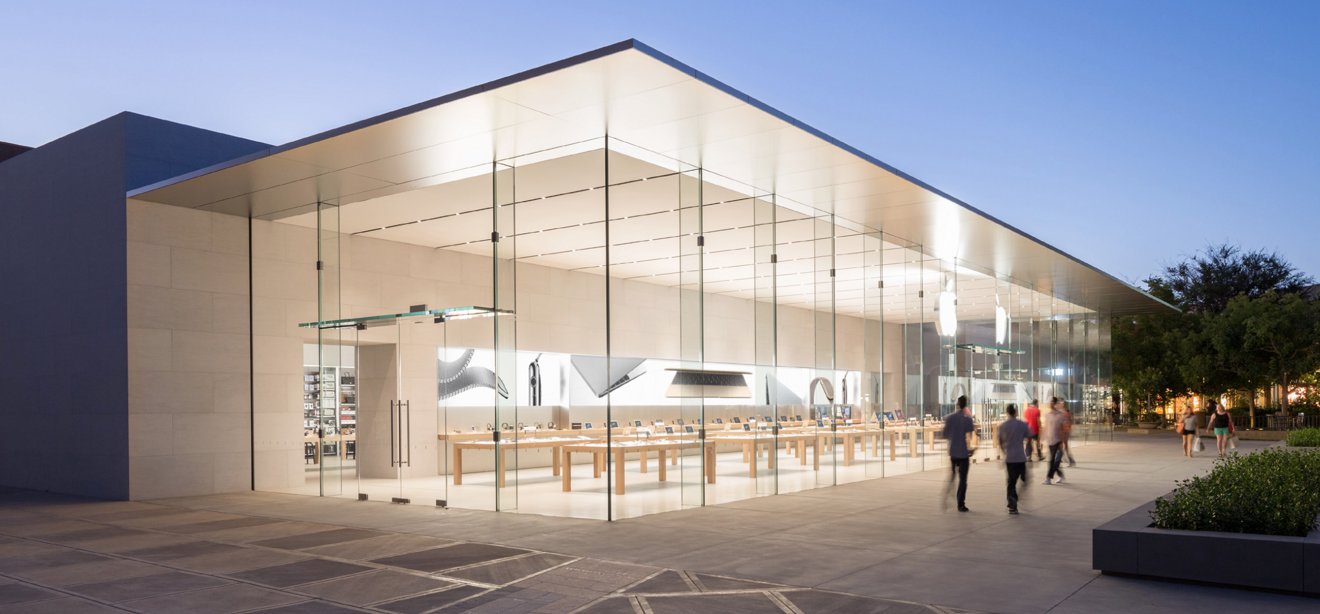Apple's plan to power its expansive retail operation entirely with renewable energy has taken a significant leap forward, the company revealed on Monday, as more than 360 Apple Store locations around the world now run on green power.
Every Apple Store in the U.S., UK, Germany, Australia, Italy, and Spain is powered by energy from renewable sources, according to Apple's latest environmental responsibility report. That number is up three fold from the 120 U.S.-only outlets that had already converted to renewable energy last April.
Apple says that it mostly purchases renewable energy from third-party providers for its retail stores, but participates in other programs — like utility green tariff programs —  if that option is unavailable. For stores in buildings that Apple doesn't own, the company works with landlords to source renewable energy on Apple's behalf or to purchase renewable energy certificates.
Fewer than 100 first-party Apple retail stores remain powered by fossil fuels or nuclear plants, and that number is set to dwindle even further in the coming months. Apple's latest solar facility in China will provide enough energy to power all of the 20-plus Apple Stores expected to operate in that country by the end of 2015.
Apple has already achieved ubiquitous renewable energy usage for its offices and data centers around the world. The company relies primarily on a combination of solar, wind, and hydropower, either from local utilities or via infrastructure projects that it owns.
 Sam Oliver
Sam Oliver








 Malcolm Owen
Malcolm Owen
 William Gallagher
William Gallagher
 Charles Martin
Charles Martin
 Christine McKee
Christine McKee
 Wesley Hilliard
Wesley Hilliard

 Andrew Orr
Andrew Orr









7 Comments
Why haven't we heard from Greenpeace yet? After all, compared to any other large corporation, Apple is the only shining star. I wonder how much of Greenpeace is funded by fossil fuel hungry corporations.
"Every Apple Store in the U.S., UK, Germany, Australia, Italy, and Spain is powered by energy from renewable sources." That's an easy claim. They don't tell you what percentage of it is renewable. Plus they don't tell you how many stores recycle their paper waste, which is pretty pertinent now that they are talking about being responsible when using natural resources. Next time you visit a store, ask them if they recycle their paper and cardboard.
Why haven't we heard from Greenpeace yet?
After all, compared to any other large corporation, Apple is the only shining star.
I wonder how much of Greenpeace is funded by fossil fuel hungry corporations.
We have. As of Feb 2015:
"It's one thing to talk about being 100% renewably powered, but it's quite another thing to make good on that commitment with the incredible speed and integrity that Apple has shown in the past two years. Apple still has work to do to reduce its environmental footprint, but other Fortune 500 CEOs would be well served to make a study of Tim Cook, whose actions show that he intends to take Apple full-speed ahead toward renewable energy with the urgency that our climate crisis demands."
Also Apple listened to them and got rid of a lot of toxic materials in their products.
Tim Cook is the man.
And how's the Foxconn transition toward replacement of line workers with robots going? I'd sure like for Appke to become less reliant on China for assembly, which would have the added effect of closing some of the supply line security holes.
"Every Apple Store in the U.S., UK, Germany, Australia, Italy, and Spain is powered by energy from renewable sources."
That's an easy claim. They don't tell you what percentage of it is renewable.
Plus they don't tell you how many stores recycle their paper waste, which is pretty pertinent now that they are talking about being responsible when using natural resources.
Next time you visit a store, ask them if they recycle their paper and cardboard.
They (Apple) do specify in the report: p6 "...we’re already running more than 360 of our Apple Retail Stores worldwide on 100 percent renewable energy."
I haven't asked any stores about their recycling, but from walking behind a couple of Apple Stores I have noticed that they tend to have a lot more stuff in the recycle bin than the non-recycle bin, which makes sense. I would imagine most of the refuse from a store is recyclable (paper, some plastic) and they don't generate a lot of non-recyclable (e.g. food waste). p21 of the report has more details, though it doesn't break out retail vs office. (It also has some interesting stuff about the Cork facility, which has a UL Zero Waste to Landfill certification)